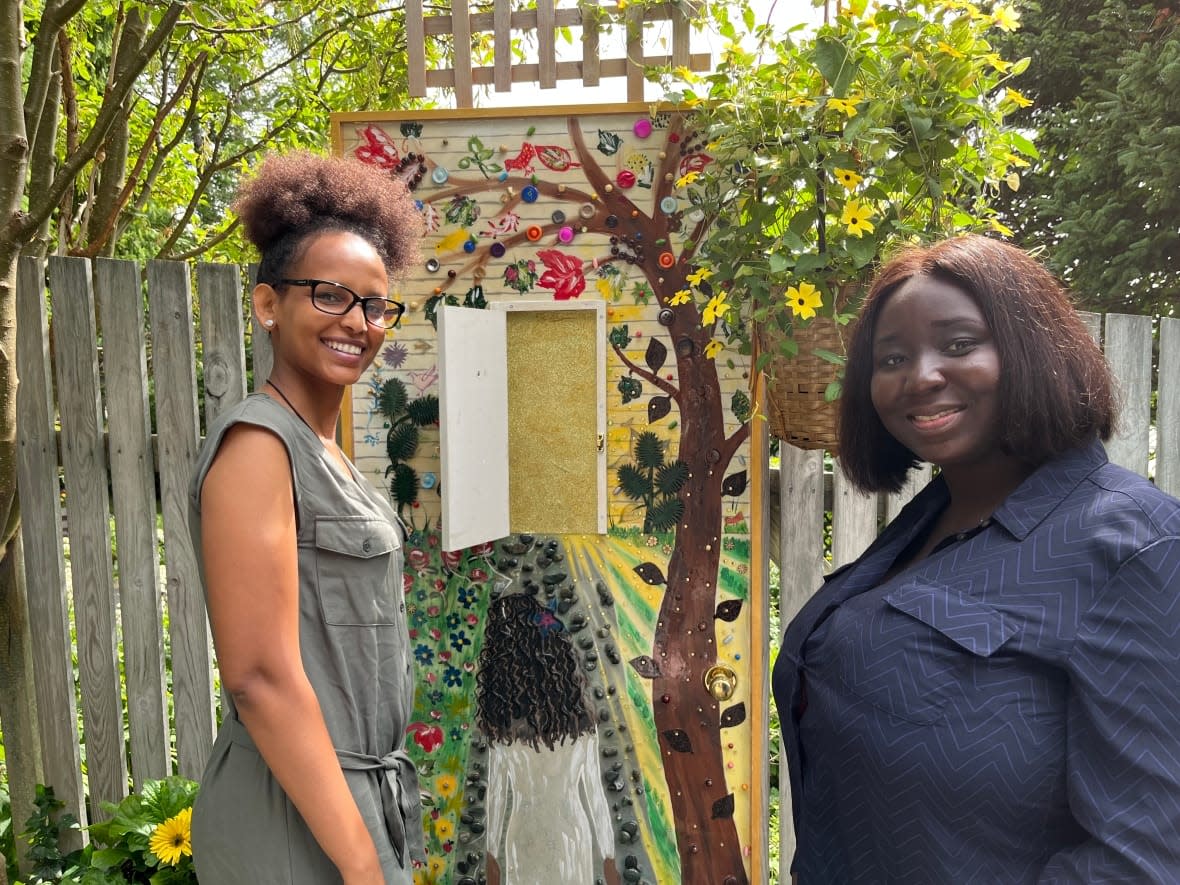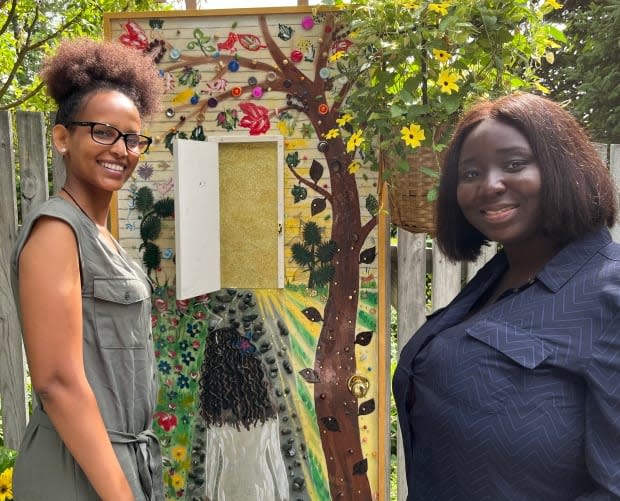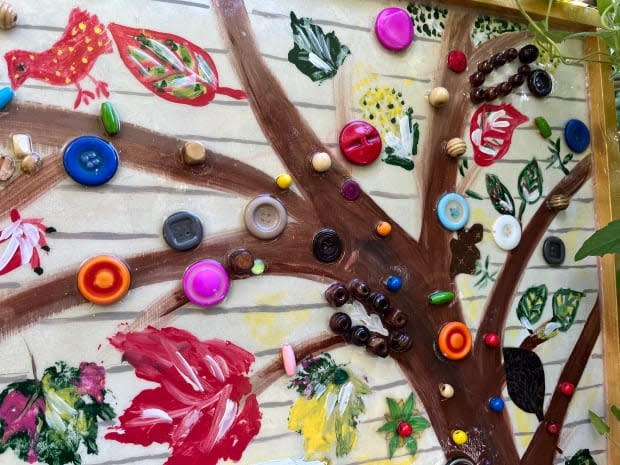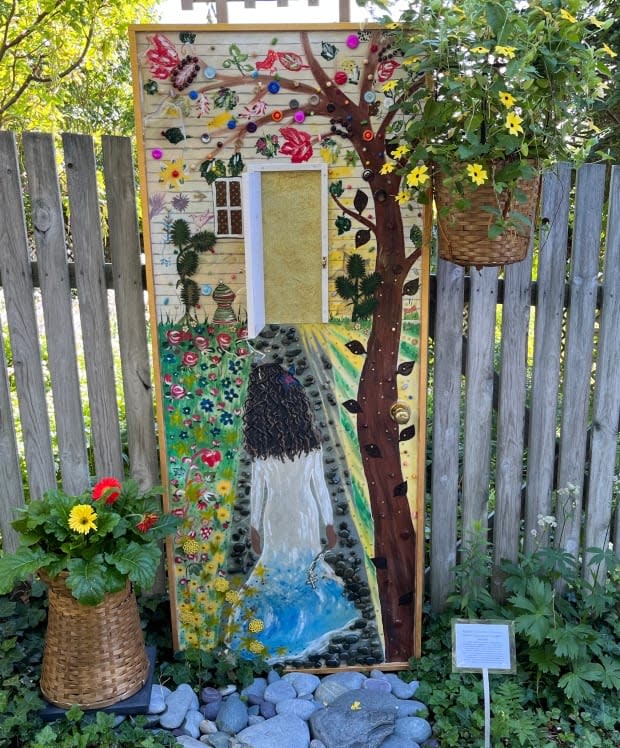Association for New Canadians raises awareness about human trafficking with art display


The Association for New Canadians is using a new art exhibit at Memorial University's Botanical Garden in St. John's to spread awareness about human trafficking in Newfoundland and Labrador.
The exhibit, which opened this month, showcases 14 painted doors, each designed by a different artist or group.
People involved with a program supporting trafficking survivors run by the Association for New Canadians — called Support, Empower, Access — designed one of the doors.
Project lead Geraldine Ankrah said the paintings help initiate important conversations about human trafficking happening locally.
"Don't think far when you hear human trafficking. Don't think it has to be by a boat. It is happening here," said Ankrah.
Human trafficking "involves recruiting, moving, or holding victims to exploit them for profit, usually for sexual reasons or forced labour", according to the federal government.
Ankrah said the association started noticing an increase of clients' reports of human trafficking in 2017.
While 2,977 human trafficking reports were made nationally between 2010 and 2020, eight incidents were reported in Newfoundland and Labrador for the same timeframe. Two of those were reported in 2020, compared to 515 incidents countrywide.

The report also said that human trafficking often goes unreported. Something Ankrah said she can confirm.
"Because it's very sensitive, I dare say that even the numbers you hear from Statistics Canada are not the numbers on the ground," said Ankrah.
"Because they are immigrants, they are scared that maybe their status will be taken away from them. So, that's why it looks low in Canada and especially here in Newfoundland."
One of the women involved in the initiative who said she has experienced human trafficking is Danait Teklemariam.
Teklemariam is originally from Eritrea and has lived in the province for two years after leaving her country in Africa's northeast in 2017.
Her search for a better life led her to Ethiopia, Sudan and then to Libya, where she spent two years.
"I had some tough experience … Personally, I was in there in prison. And at that time, we had more than 300 peoples without water, without shelter, without any clothes," said Teklemariam.
Teklemariam also said she had to pay off smugglers, twice.
When Teklemariam had finished paying off the money, she said, she first went to Tripoli, Libya's capital, and then left the country for Niger in West Africa. After roughly one and a half years, she continued on to Canada, where she now urges the federal government to help the Libyan people.
"Please, we have a lot of people, they suffer in Libya. So, I'm emotional," said Teklemariam, with tears in her eyes. "Hopefully, they will [get] good opportunity like I get."
Teklemariam said both the Support, Empower, Access initiative and the art exhibit are important because they helped her and other women connect and inform others about human trafficking.
Meanwhile, Ankrah said the art project represents journeys like Teklemariam's where a young woman who experienced human trafficking walks through a garden, toward a door.

"She's coming from a place of sadness, depression and walking toward a door of freedom," Ankrah said of the painting. She also said people involved in the art project call the Support, Empower, Access program — known as SEA — a 'lighthouse'.
"When you open the door, you're going to see some … yellow beams of light painted near the place and that's supposed to be like the light from the lighthouse. And that's supposed to be us, the SEA project."
The painted door design also includes the Eritrean national flower — the Gerbera daisy which represents a new start — waves symbolize the ocean refugees often have to cross, and a crucifix is for the women's faith.
The project members gathered at their painted door Friday to reflect on the United Nations' World Day Against Trafficking in Persons which is observed annually on July 30.
"We plan to create awareness about this ... so that we all come together and make sure that … we are known as the safest place for immigrants," said Ankrah. "We want net-zero human trafficking in Newfoundland and Labrador."
After the exhibit ends on Sept. 25, the initiative will auction off the painted door and use the funds to continue helping trafficking survivors.


